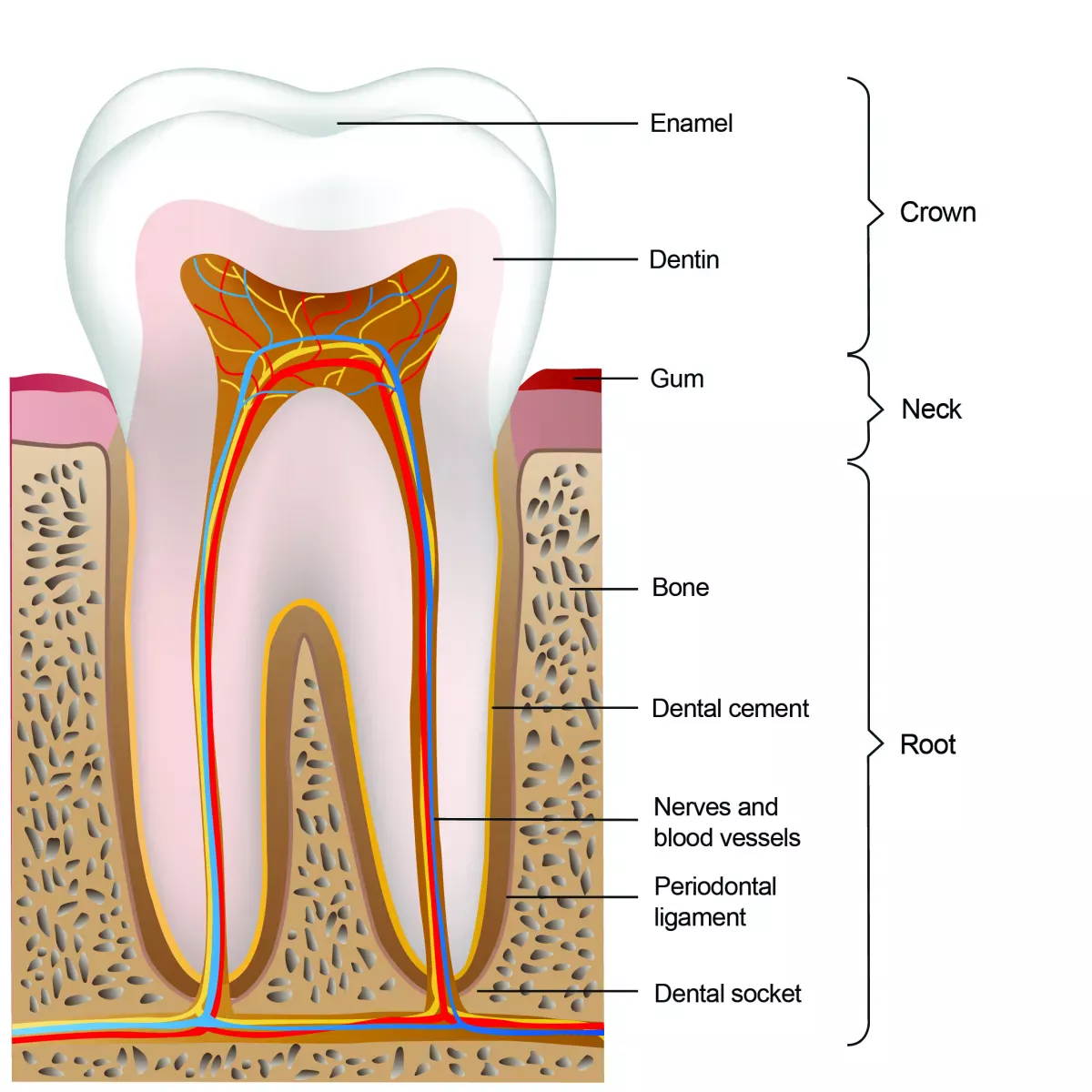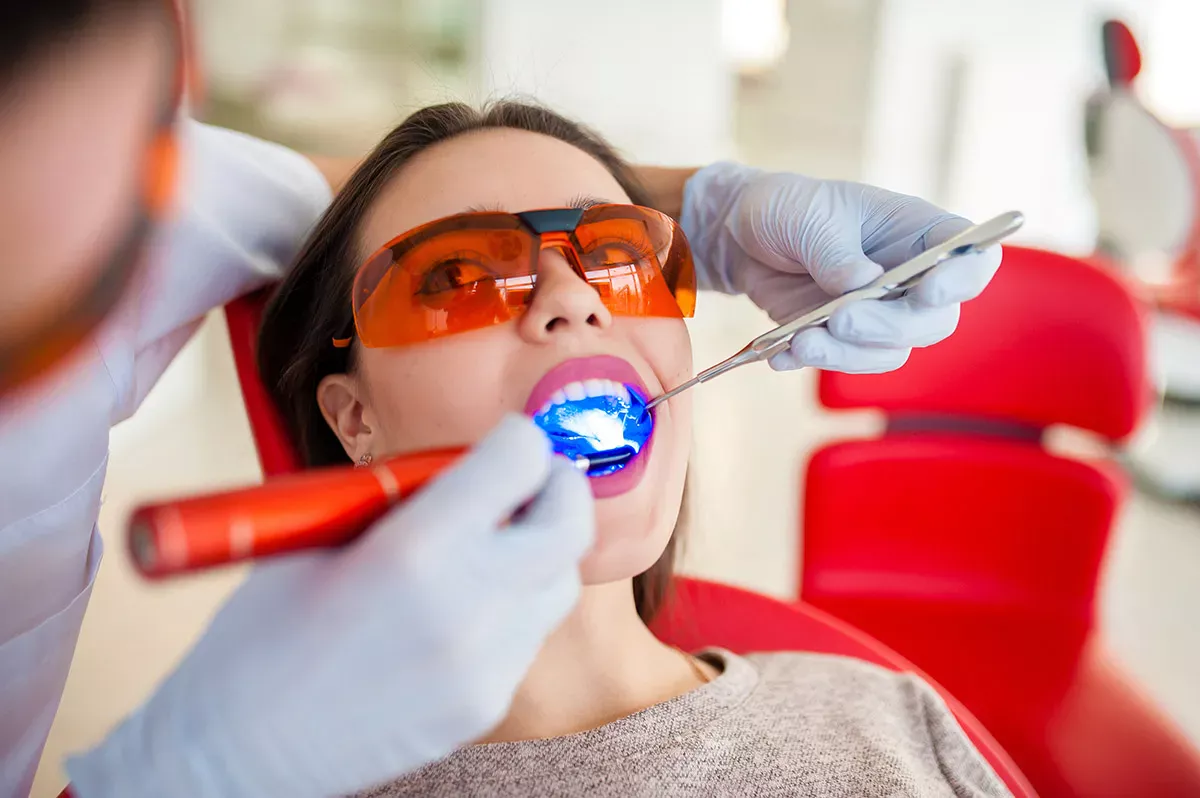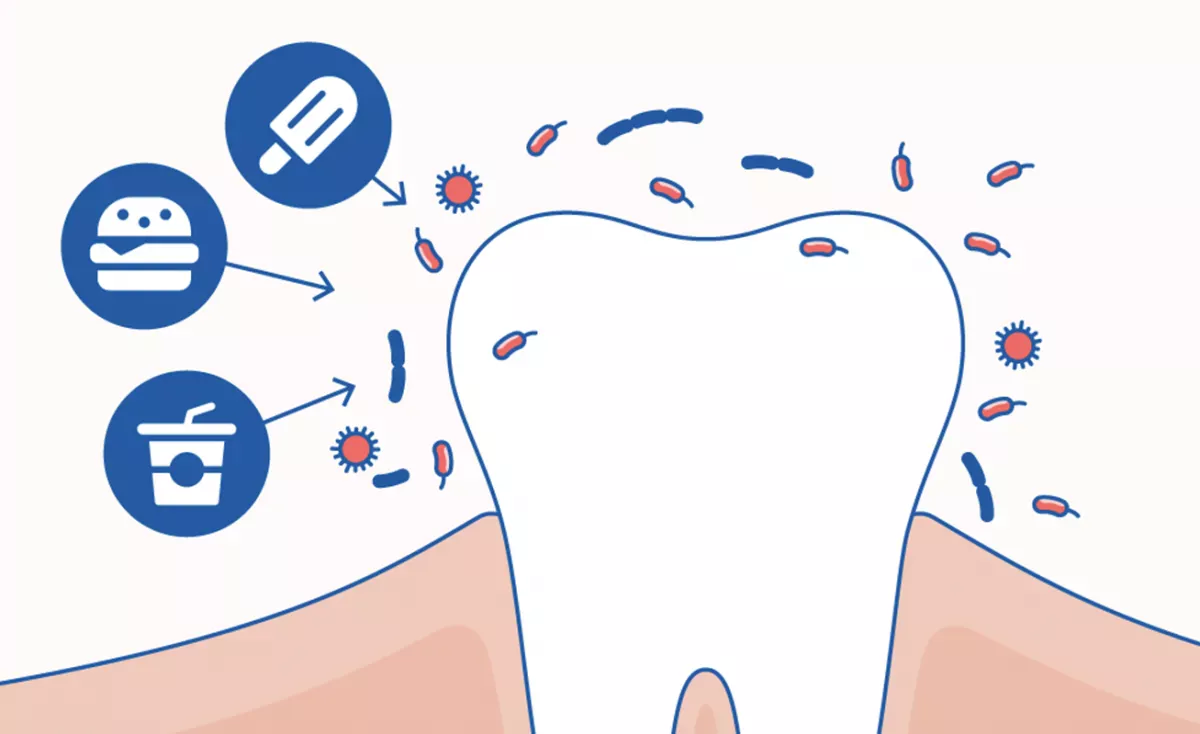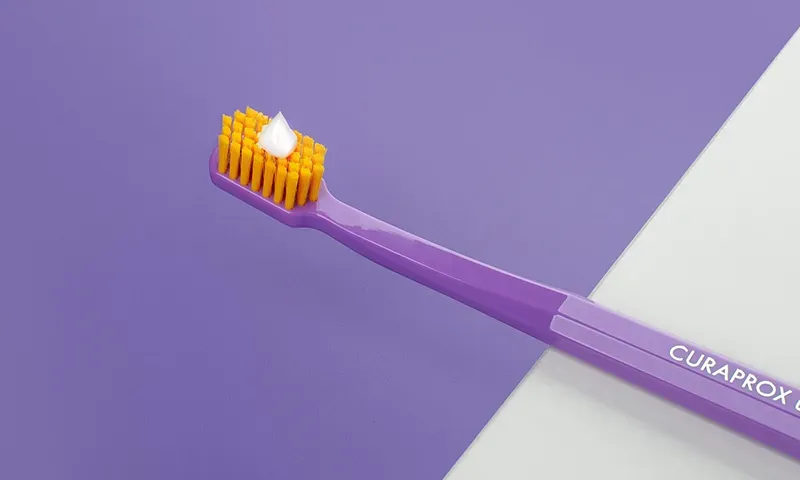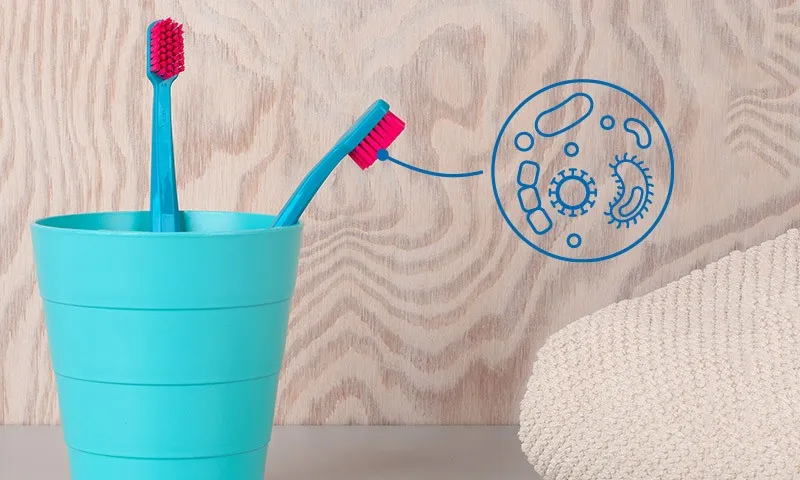Definition: What is tooth erosion?
You've probably heard the word "erosion" before. It is more familiar from the natural sciences and refers to the removal of rock or soil by wind, water or ice. This happens naturally or through human influence - for example due to incorrect farming or deforestation. The principle is the same for tooth erosion (also known as dental erosion in dentistry). The enamel and, in the worst case, the entire tooth structure is gradually worn away. The phenomenon also got its name from this fact. In Latin, "erodere" means "to wear away".
Causes
Acids are the main cause of this erosion. When they repeatedly come into contact with our teeth, they dissolve minerals from the enamel, causing it to soften and even gradually dissolve completely. As briefly mentioned above, the same applies to the entire tooth structure if no treatment is carried out.
Dental hard tissue? Short "excursion" to the structure of the tooth
Did that go too fast for you? To help you really understand tooth erosion, let's take a quick step back and explain what the tooth structure is that is being attacked by acids.
This term refers to the mineralised, hard tissue of the tooth, including the enamel. A distinction is made between three "layers":
- Enamel: The outermost layer of our teeth and the hardest human tissue.
- Dentin: A bone-like tissue, also known as dentin, which makes up the largest part of the tooth substance. It sits protected under the enamel.
- Root cementum: The outermost layer of the tooth root. It consists of 65 per cent minerals.
In the worst case, tooth erosion takes its course through all three layers, i.e. from the outside inwards to the root cement. It is interesting to note that no bacteria are involved - as is the case with caries.
The tragedy of tooth erosion: once the enamel has been destroyed, it cannot be restored. This is a huge problem for our teeth. Without enamel, they are defenceless. You can imagine it as if your car tyres had no rubber. The tyres don't last long; they break. It's the same with teeth: if tooth erosion continues to progress, there is even a risk of tooth loss.
Which acids cause tooth erosion?
You're probably wondering: What kind of acids are these that attack our valuable tooth enamel and the entire tooth structure? A distinction is made here between internal (endogenous) acids and external (exogenous) acids:
Internal acidity
Internal acid refers to stomach acid, also known as gastric juice. It is found in the stomach and breaks down food into small components so that it can be digested more easily. However, in some gastrointestinal disorders with belching (e.g. heartburn), it can enter the oral cavity via the oesophagus and come into contact with the teeth. If this happens once, it is not a problem: our saliva then balances out the acidity in the mouth itself. However, if stomach acid regularly enters the oral cavity, the saliva is often no longer able to neutralise the acidic pH value of the gastric juice sufficiently. The enzymes in the stomach acid then dissolve the tooth enamel - causing tooth erosion.
Unfortunately, all of this can also happen if a person chronically vomits - as is the case with bulimia (binge eating disorder). Even then, stomach acid regularly enters the oral cavity and can cause damage to the teeth.
Good to know:
Did you know that a dry mouth can prevent your saliva from neutralising the acidic effect of certain foods? Find out why some people have a dry mouth and what can be done about it here:
External acids
Unfortunately, there are many ways in which harmful acids can reach our teeth from the outside. Where do they hide? For example in:
- Wine / Sparkling wine
- Fruits (especially in lemons, oranges, kiwi, apples, grapefruit)
- Soft drinks
- Fruit juices
- Vinegar (salad dressings such as vinegar-oil and pickles)
- Some medications (e.g. aspirin, vitamin C preparations)
- Sour sweets (wine gums, chewy sweets)
Good to know:
Incidentally, acids are not the only cause of tooth erosion. Incorrect tooth brushing technique and, in particular, too much pressure when brushing can significantly accelerate the process. But what is the best way to brush your teeth - scientifically proven? Find out here:
Symptoms of tooth erosion
Tooth erosion often goes unnoticed at first. This is because initially "only" the top layer of the teeth is affected, which does not yet cause any discomfort. In addition, this initial damage has no effect on the colour of the teeth.
However, if the erosion continues and the enamel becomes thinner and thinner, the underlying dentin can start to shine through in a yellowish colour. The tooth surface slowly loses its natural lustre and looks duller. Sometimes very small, fine cracks appear, and those affected then have porous teeth, it can also happen that affected teeth crumble.
If the dentin continues to wear away, the teeth can become sensitive to temperature and take on a different colour. They now usually look like transparent teeth - as if they have melted away.
In addition, advanced tooth erosion can cause the areas where the teeth are curved outwards to flatten or even curve inwards. The tips and edges of the teeth can also flatten and the small, natural fissures disappear.
Unfortunately, the consequences of this abrasion are serious: in addition to the temperature sensitivity just mentioned, it can lead to malocclusion and flattening of the teeth. Enamel cracks can also form - and in the worst cases, even the pulp (innermost part of the tooth) and the dental nerve can be exposed. The end result is the loss of the tooth due to constant decay.
Good to know:
Even babies and toddlers can struggle with tooth erosion. This is often due to the fact that they often or even constantly suck on bottles filled with juices or milk. There is non-stop contact with harmful acids. To satisfy your child's need to suck, however, they don't need sweets from a bottle: Curaden soothers not only have a calming effect, they also promote the development of the palate, jaw and teeth.
Treatment of tooth erosion
The process of tooth erosion progresses in various stages. The treatment depends on these stages. If it is detected early and the teeth are not yet sensitive to hot/cold, a sealant can be applied to the tooth surfaces, which must be repeated every six to nine months. You can think of a dental sealant as giving your teeth a "protective coating" made of a special plastic. The dentist applies this sealing material to the cleaned and dry tooth. The treated tooth is usually fluoridated at the end.
In the early stages of tooth erosion, this protective measure is sufficient at best. However, in order to prevent tooth erosion in the long term, it is important to identify the cause of the tooth erosion. Does the person concerned suffer from heartburn, for example? Does he or she mainly eat acidic foods? In these cases, underlying diseases must be treated or the diet reviewed to reduce the contact of acids with the teeth. In addition, those affected must consider and implement further preventive measures such as learning the correct tooth brushing technique. You can find out all about what you can do to protect your teeth from acids in the section "Stop enamel loss : Reduce contact with acids".
If tooth erosion is at an advanced stage, the treatment is more extensive. If, for example, dents and depressions are already visible on the tooth surface or the edges of fillings are already protruding, the dentist must level out the tooth structure in these areas. To do this, he usually uses composite fillings if the posterior teeth are affected. Composites are plastic composite materials that consist mainly of ceramic, glass and quartz particles.
If the front teeth are affected, dentists often resort to veneers - thin ceramic or plastic plates that are bonded to the tooth. Fortunately, it is only necessary to treat the teeth with crowns or partial crowns in particularly severe cases.
Good to know:
Veneers can "repair" and conceal larger defects on the teeth. How exactly does the treatment work? And are there any disadvantages? You can find out all about it here:
Stop enamel erosion: Reduce contact with acids
The best thing to do is to prevent tooth erosion from occurring in the first place. Because, as you have already experienced, lost tooth structure is irretrievably gone. Tooth erosion can no longer be reversed. The good news is that you can do a lot to protect your teeth and stop the further loss of tooth structure. We explain exactly how to do this here.
Pay attention to your diet: avoid highly acidic foods
The biggest drivers of tooth erosion are acids from food. Ideally, you should reduce or avoid the consumption of such foods. Drinks such as energy drinks, sweet drinks such as carbonated fruit juice mixes and alcoholic soft drinks ("alcopops") are particularly acidic. The constant and excessive consumption of fruit, which many people consider to be particularly healthy, is also harmful to teeth. This is because fruit contains fruit acid. However, it is wrong to avoid fruit altogether. After all, fruit naturally provides us with important nutrients. The smart thing to do is to find a compromise - for example, by not snacking on fruit constantly throughout the day, but only treating yourself to the fresh fruit bomb once a day, perhaps as a dessert after lunch.
A tip for professionals: combine citrus fruits, which are particularly hard on the teeth, with a little yoghurt. Although dairy products themselves are also acidic, they can neutralise the damaging acids! What's more, they contain plenty of calcium, which helps to harden tooth enamel.
There is also good news for tea lovers: black and green tea can help to strengthen tooth enamel.
Practical everyday tips for enjoyable and responsible eating and drinking
Of course we know that: Nobody manages to stay completely away from acidic foods in their diet. And as you have just learnt, this is not necessarily advisable in the case of fruit. Here we give you practical everyday tips on what you can do when eating acidic foods to minimise damage to your teeth.
- Drink sour and sweet drinks in one go rather than in small sips over a longer period of time.
- Use a straw when drinking acidic drinks to minimise contact with your teeth.
- It is best to drink an acidic drink with a meal. This makes it easier to neutralise the acid.
- Not for everyone, but helpful: rinse your mouth with water - or a little milk - after consuming acidic drinks or food. Milk has a neutralising effect. Eating cheese has the same effect.
- Take tooth-friendly chewing gum with you when you're out and about. They prevent a dry mouth and stimulate your saliva flow. This is important because your saliva can neutralise acids.
Good to know:
Chewing 'Black is white' chewing gum from Curaprox not only stimulates the flow of saliva. Thanks to the activated charcoal it contains, it also gently whitens teeth - without losing valuable tooth enamel. Xylitol also protects against tooth decay and provides a pleasantly sweet flavour.
Check your dental hygiene
The harder you scrub, the better? Better not! If you want to brush your teeth thoroughly, you don't have to be brutal. Quite the opposite: if you brush too hard, you will rub off additional tooth enamel. Therefore, make sure you use a toothbrush with very soft bristles - or use an electric toothbrush with adjustable thicknesses and soft brush heads.
Good to know:
The super-soft CS 12460 Velvet toothbrush from Curaprox has 12,460 velvety-soft bristles. Comparison: A conventional toothbrush usually has around 500 bristles. If you prefer electric: the Hydrosonic easy gently cleans your teeth with up to 84,000 cleaning movements per minute and has extra sensitive brush heads.
Choosing the right toothpaste is just as important as brushing gently. This should contain fluoride. Fluorides are deposited in the tooth enamel and form a "protective film" around the teeth. They also have a kind of superpower: the fluoride ions form the mineral fluorapatite - which is even harder than the enamel itself. Fluoride therefore makes the tooth surface more resistant to acids and erosion. Wondering how much fluoride is good for your teeth? You can read all about it in our article "Toothpaste containing fluoride".
Good to know:
Do you want to provide your teeth with sufficient fluoride? Enzycal 1450 PPM Fluoride toothpaste from Curaden has an extra high fluoride concentration and also contains three natural enzymes that strengthen your saliva's natural defences.
And another tip for your dental hygiene that many dentists recommend: Do not brush your teeth for half an hour after eating acidic foods. This is based on the assumption that these foods temporarily soften the tooth enamel, which is then too sensitive for immediate brushing. Waiting, on the other hand, causes the saliva to remineralise the enamel through the enzymes it contains, so that it is more robust again after 30 minutes and the oral flora has recovered.
Sources:
Kleis Health Centre: Heartburn.
Initiative proDente e.V.: Insider tip: tea.
Julian Jankowski Dental practice: Acid damage to tooth enamel due to heartburn.
National Association of Statutory Health Insurance Physicians: Fissure sealing.
Thuringia Dental Association: Tooth erosion.
S&H Dental Centre: Abrasions and erosions.
Swiss Dental Association: Dental erosions.
Swiss Dental Journal: The erosive effect of various drinks, foods, stimulants, medicines and mouthwashes on human tooth enamel.
UKGM - University Hospital Giessen and Marburg: Dental erosions.
Zahnärztliche Mitteilungen, zm-Redaktion: Alcopops, lemonade and co.
All websites last accessed on 15 July 2024.
 Swiss premium oral care
Swiss premium oral care

